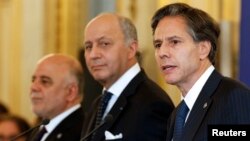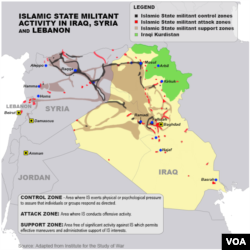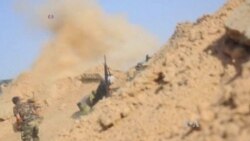The coalition of countries fighting the Islamic State group have backed an Iraqi plan to retake Anbar province and its capital, Ramadi, which fell to the extremists last month.
Baghdad’s plan, presented Tuesday by Iraqi Prime Minister Haider al-Abadi at a multilateral ministerial meeting in Paris, aims to get more recruits for the Iraqi army and more tribal fighters mobilized and armed.
Following the talks, U.S. Deputy Secretary of State Antony Blinken said it was the right plan, militarily and politically.
“In Iraq right now," he said, "we have the right strategy," which he described as a combination of conducting coalition airstrikes plus training, equipping and assisting local partners. "That is the winning strategy, but only if both sides of the equation are present. What we heard today is that Prime Minister Abadi’s side of the equation is present and adjusting to the challenges that we are seeing in places like Anbar.”
Blinken said the coalition had made real gains in Iraq, but he acknowledged setbacks on the battlefield.
"We had a very good discussion today, a candid discussion that was honest about the gains that we have made, as well as the setbacks that we have incurred," he said.
Officials stressed the need for more equipment and training to bolster the offensive. Coalition partners will start shipping anti-tank rockets to Iraq for use against suicide vehicles operated by the Islamic State group. “The first tranche of these rockets will arrive as early as this week," Blinken said.
U.S. officials, however, have criticized Iraqi forces for not fighting harder at Ramadi, and coalition members want Iraq to be more inclusive of Sunni fighters.
Watch related video report by Jeff Custer
Request for more support
Abadi had said prior to the strategy meeting that his pro-government forces were not getting enough support from the international coalition. He said there needed to be more intelligence, and that coalition efforts to block foreign fighters from joining the Islamic State group had not stopped the number of such combatants crossing into Iraq.
The coalition is not providing ground troops; it is instead relying on a campaign of airstrikes to support pro-government forces. Since early August, warplanes have conducted more than 4,200 airstrikes in Iraq and Syria, according to Pentagon data. Overnight, they continued with five strikes in Syria and 10 in Iraq.
The talks in Paris came two weeks after the Islamic State group seized Ramadi, the Anbar province capital 125 kilometers west of Baghdad, prompting Abadi to call on militias to rush to the area to take part in a counteroffensive that launched last week.
Kerry participating remotely
Participating in the conference by telephone from the United States, where he returned following an injury in a bicycle crash in France over the weekend, U.S. Secretary of State John Kerry called Islamic State "a resilient and utterly ruthless foe that has weaknesses and can be defeated. We have known from the start that this would be a difficult, multiyear campaign. And make no mistake: What happened in Ramadi was a setback. But it is one that we can help the Iraqis overcome."
In Paris, French Foreign Minister Laurent Fabius said the coalition was united and determined but also acknowledged that the fight against Islamic State would take a long time.
Julien Barnes-Dacey, a senior policy fellow at the European Council on Foreign Relations, agreed that the campaign against Islamic State needed more military and political commitment, and he said there was also a key player missing: Iran.
"Moving forward, it seems that there is going to have to be a greater and broader dialogue with Tehran if there’s going to be any success," Barnes-Dacey said. "Because without a political approach underpinning a military approach, it is hard to see any solution to the crisis being found."
Watch related video by Ali Javanmardi of VOA's Persian service:
Suicide blast
Islamic State militants drove a tank filled with explosives onto an Iraqi police base Monday, killing at least 37 people and injuring dozens more. The suicide bombing near Samarra, northwest of Baghdad and north of IS-held Ramadi, targeted security forces and triggered a secondary explosion in an ammunition depot on the base.
Military and paramilitary forces are using the area as a launch point for anti-Islamic State operations.









